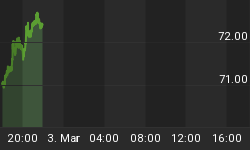Below is an extract from a commentary originally posted at www.speculative-investor.com on 26th February 2006.
Iran has been on the minds of many investors over the past few months, for two main reasons. First, there's the Iranian Government's clearly-stated intention to push ahead with its nuclear ambitions. These ambitions have not been spelt out, but Iran's refusal to allow its nuclear facilities to be inspected, combined with the perception that senior members of the country's government are Islamic extremists bent on initiating a military conflict, creates the suspicion that efficient electrical power generation is not the only goal of the nuclear program. Second, there's Iran's decision to establish an oil bourse on which the world's most important commodity will trade in euros rather than US dollars. This, according to some commentators, threatens the status of the US$ and, as a consequence, poses a threat to the economic well-being of the US.
We can dismiss the second of the aforementioned concerns because Iran pricing its oil in euros will not have a material effect on the US dollar. If Iran wants euros or some currency other than the US dollar then it can simply convert any dollars it happens to receive into the currency of its choice on the foreign exchange market. And this is almost certainly what it has been doing for many years. Demanding that it receive payment in euros would therefore just mean that the conversion from dollars to euros happened at a different stage in the process, but the overall demand for each currency would be unchanged.
Some people have argued that the US can, and regularly does, create dollars 'out of thin air' and that this provides a substantial benefit to the US by effectively allowing it to get something (valuable resources such as oil) for nothing (dollars created at zero cost by the US Fed). This statement contains an element of truth in that today's monetary system exists for the purpose of allowing governments and banks to get something for nothing, but the US companies that import oil can't just print the dollars they need; they have to earn them. And again, the overall demand for US dollars will be the same regardless of whether a US oil importer pays for oil in dollars with the seller of the oil then converting the dollars to euros, or pays for it in euros.
In our opinion, the pricing-oil-in-euros issue is a storm in a teacup. It won't have a significant effect on the financial markets and it won't prompt a dramatic response from the US Government. The brewing conflict over Iran's nuclear program does, however, have the potential to develop into a major driver of market action over the remainder of this year.
If the conflict with Iran escalates then all the financial markets will be affected in a big way with the greatest positive effect likely to be seen in the oil market and the greatest negative effect likely to be seen in the stock market. And of these two markets we think the oil market will be the more reliable leading indicator of escalating conflict in the Middle East. This is because there are good reasons unrelated to Iran to anticipate a sizeable stock market decline over the coming 6 months, but for the oil price to move to new highs during 2006 it will probably have to garner a much larger geopolitical risk premium than currently exists.
The financial markets are quite good at 'sniffing out' the likely impact of a known threat, and at this stage the price action in the oil market suggests that a military conflict with Iran will not occur within the next several months. We say this because although the oil price jumped $2 on Friday in response to a thwarted attack by suicide bombers on a large Saudi oil facility, the overall impression created by the following daily oil futures chart is more bearish than bullish. Note, in particular, that a) the December-January surge in the oil price appears to have resulted in a successful test of the August-2005 peak, and b) it is taking a steady stream of oil-bullish geopolitical news (Iran, Nigeria, Saudi Arabia) just to prevent the oil price from breaking down through important support in the mid-to-high 50s.
In the absence of major supply shock we think the oil market will, over the next few months, complete the topping process that began during the third quarter of last year and break below support in the mid-50s. A daily close below the February low ($59 on the following chart) would be a clear signal that the story was, in fact, unfolding in this way, whereas a daily close above $66 would be a warning that a major supply shock -- potentially related to military conflict with Iran -- was on the cards.

















